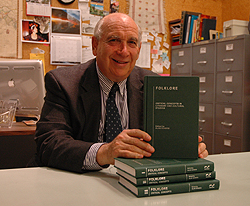Berkeleyan
Folklorist Dundes edits mini-library
At $850 it's no stocking-stuffer, but that's not his intention. The idea is for these readings to inform students worldwide about the discipline
![]()
17 March 2005
 Alan Dundes and his four-volume set of folklore readings. (Deborah Stalford photo) |
"Anyone who reads these four volumes will know what folklore is," says Dundes, who a year ago was approached by the London-based Routledge publishing house to edit the set. "There's nothing like this. This sort of stakes out the field."
The final product is a set of 86 essays and excerpts on such topics as theories and methods of folkloristics, the use of folklore as a political tool in Nazi Germany, the Grimm brothers, Orientalism and Palestinian folklore, superstition and popular religion, the study of proverbs, bird-scaring and herding rhymes, and more. It also features work by or about such folklore luminaries as Johann Gottfried von Herder, James George Frazer, Max Möller, Wilhelm Mannhardt, and Dundes himself.
"I sort of pride myself on being a library scholar, and over the years I've dug up some interesting papers that I've included in these volumes," says Dundes. "It's a personal assessment of the field, granted - no two people would include the same papers."
The set of handsome, dark-green hardbacks sells for about £425, or $850, so Dundes isn't expecting them to become best-sellers. However, he says they can be critical additions to college, university, and even a few public libraries.
"While folklore is an academic subject at universities around the globe, no English university teaches it," Dundes says. When Routledge approached him, he adds, "I thought if I don't do it, they might get someone in England to do it, and that would be a disaster. Because there is really no one in England who is part of the international scene."
The new volumes, however, should be a valuable resource for students and scholars on this side of the pond as well. "I'm hoping that libraries - they're the ones who can afford this - will have this in the reference section, because it turns out that at almost all schools and colleges, there are people who would study folklore if they knew about it," Dundes says.
"It's a service to the field, in that sense, to put in convenient, four-volume form enough of the major ideas in folklore that somebody at a small college coming upon this set can plunge in and realize that there is an international discipline that studies customs, folk songs, and so on."
Unlike other compilations Dundes has overseen, this time he had no space constraints and was not forced to make cuts. In addition, he had "carte blanche" to survey existing folklore literature and select and arrange essays for the set.
"I found some real gems," he says, such as a paper by P.W. Filby, once secretary to Sir James George Fraser, author of the 1922 classic The Golden Bough. "He talked about what it was like when they were very old, Fraser and his wife, and the interaction between them," Dundes explains. "She was deaf, he was blind, and Filby was trying to satisfy both of them. And he writes about his memories in a wonderful little piece called 'Life Under the Golden Bough.' There are other papers like that that even people in folklore won't know."
Dundes, who joined the Berkeley faculty in 1963, is the author of a dozen books and more than 250 scholarly articles, and has co-authored or edited more than 20 books. Among many other honors, he received the Sigillo d'Oro Pitrè Prize for lifetime achievement in folklore in 1993 and Berkeley's Distinguished Teaching Award in 1994. In 2001 he became the first folklorist to be elected a member of the American Academy of Arts and Sciences.
For more information about the just-released folklore set, visit www.routledge.com.

